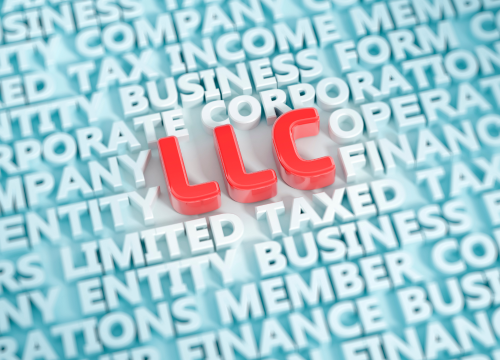Difference Between LLC and S Corp
Setting up a new business venture? Picking the right business structure is crucial. Luckily, there are various ways to structure your business, with five primary types being partnership, LLC, sole proprietorship, S corporation, and C corporation. However, we’re going to talk about LLC and S corporation in this article. We also break down the main differences between the two.

What is an LLC?
A limited liability company (LLC) is a business entity that combines the limited liability features of a corporation with the flexibility and simplicity of a partnership firm. One of the main advantages of an LLC is that its owners enjoy limited liability, meaning their personal assets are typically protected from business debts and liabilities.
LLCs can choose not to pay federal taxes directly. Instead, the profits and losses are reported on the personal tax returns of the owners. They are easier to set up and with lesser regulatory requirements than other business entities.

What is an S Corporation?
An S corporation (S-corp) is a type of business structure that combines elements of both a traditional corporation (C Corp) and a partnership or sole proprietorship. However, an S-corp is not considered a business entity; instead, it’s a tax classification that allows business owners to treat taxable business income differently.
S corporations have specific ownership restrictions, capped at 100 shareholders, all of whom must be U.S. citizens or residents.
Like an LLC, an S corporation is a pass-through entity for federal income tax purposes. This means that the corporation itself does not pay income taxes. Instead, profits and losses are “passed through” to the shareholders, and they report this income on their individual tax returns.
Difference between LLC and S-corp
Ownership
Owners of an LLC are called members. There are no restrictions on the number or types of owners (individuals, other LLCs, corporations, etc.).
S Corporations have restrictions on ownership. They cannot have more than 100 shareholders, all of whom must be U.S. citizens or residents. Other corporations, partnerships, and non-residents are generally not allowed to be shareholders.
Management Structure
Members of an LLC can choose to manage the company themselves or appoint managers to handle day-to-day operations. This provides flexibility in decision-making.
S corporations have a more rigid management structure, with a board of directors overseeing major decisions. Shareholders typically elect the board, and the board then picks officers to manage daily operations.
Taxes
LLCs are treated as pass-through entities for tax purposes. Profits and losses pass through to individual members, who report them on their personal tax returns. The LLC itself does not pay federal income taxes.
Just like LLCs, S corporations also use pass-through taxation. This means the business profits aren’t taxed at the company level. Instead, they go to individual shareholders, who report the income on their own tax returns.
Flexibility in Profit Allocation
LLCs have flexibility in allocating profits and losses among members, regardless of their ownership percentages, as specified in the operating agreement. Generally, there are no specific eligibility requirements, and LLCs can be formed by individuals, other businesses, or entities.
In S corporations, how profits and losses are shared depends on how many shares each shareholder owns. However, they must meet certain eligibility requirements to qualify.
LLCs vs. S-corps: Comparison Chart
| LLCs | S-corps |
| LLC is a business entity. | S-corp is a tax classification. |
| LLCs offer personal liability protection. | S corporations offer both personal and corporate liability protection. |
| It is relatively simple to establish. | More complex filing with the IRS, state, and specific eligibility requirements. |
| Unlimited members (individuals, corporations, and other LLCs). | Maximum of 100 shareholders (US citizens/residents only). |
| Flexible structure: member-managed or manager-managed. | Board of directors and officers required. |
| Minimal ongoing requirements. | More stringent recordkeeping and reporting requirements. |
| Ideal for startups, small businesses, and sole proprietorships. | Ideal for businesses with high income and active owners who want to minimize self-employment taxes. |
Summary
Before establishing either an LLC or an S corporation, it’s advisable to research the specific requirements and fees in the state where you plan to form the business. Consider factors like business size, income, ownership structure, and future growth plans.
Although complex business structures offer better tax benefits and sophistication, they are more expensive to establish and manage. These often need the expertise of lawyers and accountants.
FAQs
What are the pros and cons of an S Corp?
Pros:
- Single layer of taxation
- Limited liability protection
- Potential for lower self-employment taxes
- Pass-through of losses
Cons:
- Strict eligibility requirements
- Complex filing and recordkeeping
- Payroll tax requirements
How do LLC members get paid?
LLC members, unlike employees, don’t receive regular salaries. They can withdraw profits from the business based on their ownership percentage (“drawings”).
What are the benefits of having an LLC?
LLCs are easier and less expensive to set up compared to corporations. Profits and losses flow through to members’ personal tax returns. Additionally, there are fewer formalities and filings compared to corporations.
What is the difference between C Corp and S Corp?
C corporation:
- Profits are taxed at the corporate level and again on dividends distributed to shareholders.
- No limit on shareholders.
- More complex structure and governance requirements.
S corporation:
- Profits and losses flow through to shareholders’ personal returns, avoiding double taxation.
- Limited to 100 US citizen/resident shareholders.
- Stricter eligibility requirements and administrative burden.
What are the tax benefits of an LLC in Canada?
In Canada, there are no LLCs, but they have something similar called a Limited Liability Partnership (LLP) with comparable advantages. However, tax implications for LLPs can be complex and differ based on individual situations.
Which state is best to open an LLC?
Wyoming, Delaware, and Nevada are known for their business-friendly regulations and low filing fees.
What is the disadvantage of an S Corp?
S corporations have strict eligibility requirements, more complex filing and recordkeeping, and payroll tax complications.
What is the disadvantage of a corporation?
- Profits are taxed at the corporate level and again on dividends distributed to shareholders.
- Requires Board of Directors, officers, and formal meetings.
- More expensive to set up and maintain compared to LLCs or S corporations.
What is the difference between a sole proprietorship and an S Corp?
- Ownership: Sole proprietorship = single owner; S Corp = multiple shareholders.
- Liability: Sole proprietor = unlimited personal liability; S Corp = limited liability protection.
- Taxes: Sole proprietor = business income taxed on personal return; S Corp = pass-through taxation with potential self-employment tax optimization.
- Formalities: Sole proprietorship = minimal; S Corp = more complex filing and record keeping requirements.
- Difference Between Caucus and Primary - June 18, 2024
- Difference Between PPO and POS - May 30, 2024
- Difference Between RFID and NFC - May 28, 2024
Search DifferenceBetween.net :
Leave a Response
References :
[0]Image credit: https://www.canva.com/photos/MAEEtu3RhGo-llc-conecpts/
[1]Image credit: https://www.canva.com/photos/MADm6jLGKzQ-main-types-of-business-formations-including-sole-proprietorship-s-corp-partnership-llc-and-incorporations-represented-by-building-blocks-/
[2]Majaski, Christina. “LLC vs. S Corporation: What's the Difference?” Investopedia, 15 Oct. 2022, www.investopedia.com/articles/personal-finance/011216/s-corp-vs-llc-which-should-i-choose.asp.
[3]Hoory, Leeron, et al. “LLC Vs. S-corp: What Are They And How Are They Different?” Forbes Advisor, 6 Dec. 2022, www.forbes.com/advisor/business/llc-vs-s-corp/.
[4]Simons, Tad. “S corp vs C corp vs LLC: What’s the difference, and which one is better for your business?” Thomson Reuters, 8 Sept. 2023, tax.thomsonreuters.com/blog/s-corp-vs-c-corp-vs-llc-whats-the-difference-and-which-one-is-better-for-your-business/.
[5]Kellman, Joseph. “LLC vs S-Corp: What’s the Difference?” MarketWatch, 18 Jan. 2024, www.marketwatch.com/guides/business/llc-or-s-corp/.
